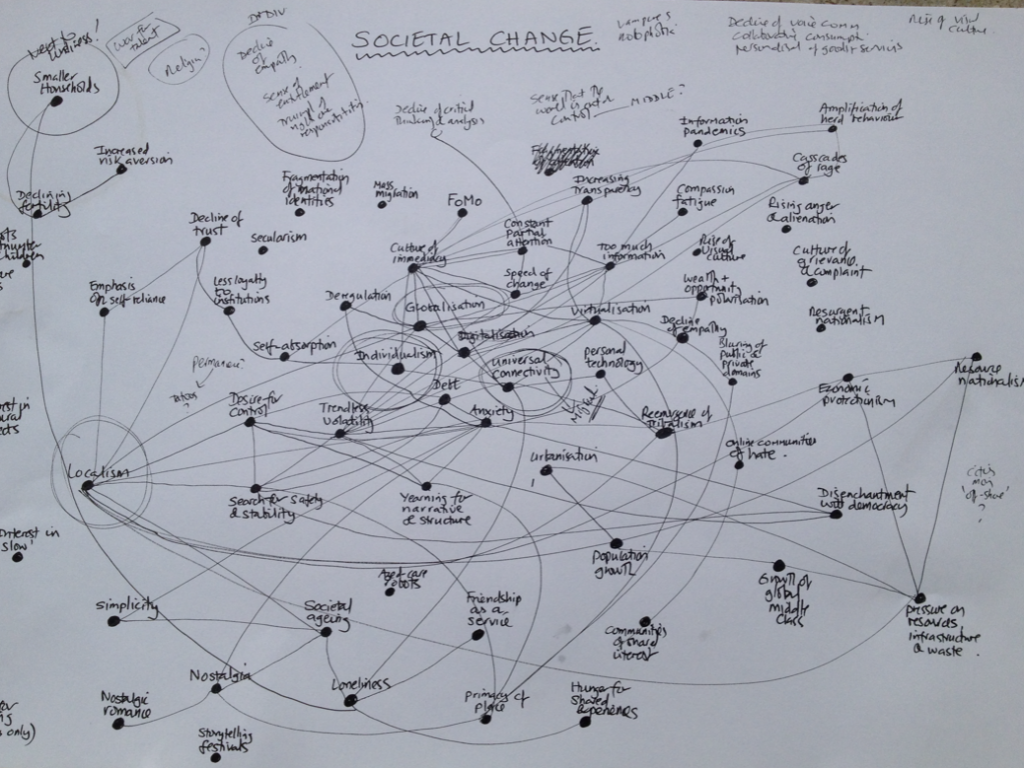This is from ABC Radio National in Australia (a bit like BBC Radio 4). It was recorded at the Avid Reader bookstore with Paul Barclay as host. About 50 minutes.
Click here to listen.

This is from ABC Radio National in Australia (a bit like BBC Radio 4). It was recorded at the Avid Reader bookstore with Paul Barclay as host. About 50 minutes.
Click here to listen.
Long-time readers may remember that as well as maps I have a thing for cards. I’ve previously helped to create a set of cards for PWC to help CFOs discuss the distant future and I also created a set, along with Oliver Freeman, for Public Libraries New South Wales in Australia. I also have a set of Oblique Strategies cards from Brian Eno and Peter Schmidt along with various vintage playing game games.
My latest collaboration is with Tech Foresight at Imperial College with whom I’ve created a set of conversation cards aimed at people in R&D, horizon scanners and people engaged in foresight activities. In this instance there are 64 cards from four categories – cities, resources, data and workforce – along with five wildcards or jokers. The point of the pack is again to stimulate discussion about alternative futures. The cards are still in beta and there aren’t may sets around currently, but if you’d like a set they are available at cost, which is £30 plus postage.
 This is a rough of the society and social change line (line 1) on my new map. The final thing wonlt look anything like this, of course, but I’m trying to explore what’s important and what’s not and also how things might connect. There are a total of 15 lines at the moment.
This is a rough of the society and social change line (line 1) on my new map. The final thing wonlt look anything like this, of course, but I’m trying to explore what’s important and what’s not and also how things might connect. There are a total of 15 lines at the moment.
More on the map development here.
Just when I thought that all hope had been lost for decent journalistic analysis a small article comes along yesterday in the London Evening Standard about Pokemon. More precisely, the article is about why large parts of the world might be fiddling with Pokemon Go on their mobile phones while large parts of Syria burn and women that are raped in Qatar are accused of having sex outside marriage. People are even trying to catch Pokemon in Auschwitz. OMG.
So what’s it all about then? The article, by Sam Leith, suggests that the obsession could represent a more comfortable way of being alone. The world, which is chaotic and scary, has been turned into an occult map that is, above all else, understandable. “Poundland animism in an age of disenchantment.”
Leith also makes a connection with JG Ballard, who pointed towards “ever-absurder collocations of the brutal and frivolous.” Bread and circuses for those brought up with Call of Duty and Fruit Ninja perhaps.
Finally started the new mega-map of global trends & technologies after 2 or more years. I’ve got all the data as a word file, but it now needs to be added to the map and edited on the map and then all physically connected together. Got to love a job where you still get to use kids coloured felt-tip pens aged 50+
If you like mega-trends keep your eye on the blog as I’ll be adding quite a bit of material, including the long list of contenders.
Don’t take it seriously or as final at this stage. Things will move around and be deleted. The lemon? Weighing the paper down in the wind (Bradley)! I was going to invert the image below, but I think it’s symbolic of a world turned upside down.
I’m starting to think about my next book and although the illusion of progress is a fairly tempting title there’s the danger of it being mistaken for a negative position (actually the positive impact of negative thinking is interesting theme in itself). So, alternatively, I’ve been thinking again about thinking. What influences it? How can we increase the quantity and, more importantly, the quality of our thinking?
I’ve been thinking about this sitting in my favourite chair, in my greenhouse, drinking red wine and smoking a cigar.
Just spent a couple of days with the Ministry of Defence trying to work out what the world might look like 30 years hence (2046). Lots of really interesting people around. Best bit was probably my science fiction writer friend who said that he really couldn’t deal with it because he couldn’t get his head around such a short time frame.